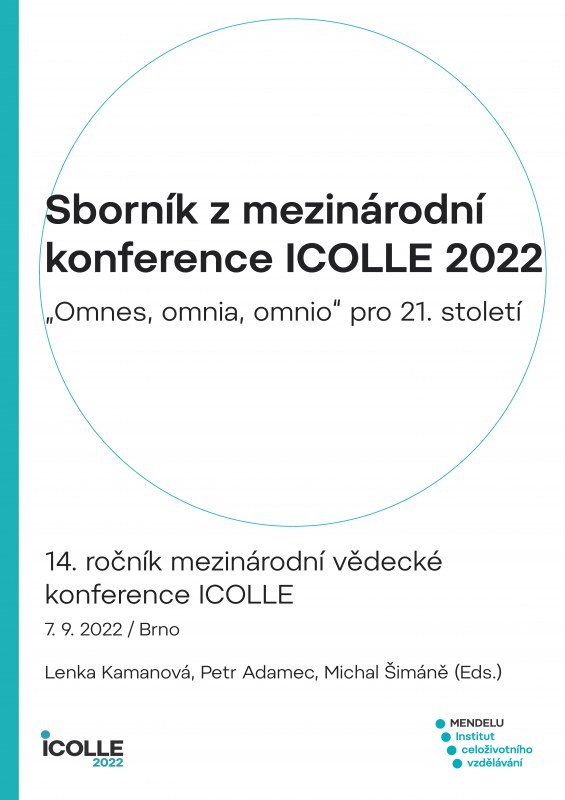
DOI: 10.11118/978-80-7509-922-8-0155
AKTUÁLNE NEURODIDAKTICKÉ ASPEKTY EDUKÁCIE ŠTUDENTOV STREDNEJ ŠKOLY
- Dáša Oravkinová
Empirická štúdia má za cieľ mapovať vývin individuálnych kognitívnych schopností sebahodnotením, s dôrazom na zrakové a sluchové vnímanie a pozornosť, pamäť, sociálne kompetencie a odborný rast; s rozlíšením jednotlivých študijných ročníkov. Na základe priebežných pozorovaní z priamej pedagogickej praxe, sme stanovili celkové prevažujúce hypotézy (H) nasledovne: H1 nárast zrakových kognitívnych schopností, H2 pokles sluchových kognitívnych schopností, H3 stagnácia v pamäťových funkciách, H4 neistota v sociálnych kompetenciách, H5 neistota v odbornom raste. Štúdie sa zúčastnili študenti strednej školy, vo vekovej kategórii od 15 do 17 rokov. Elektronický dotazník pozostával z 13. tém, týkajúcich sa kognitívnych, sociálnych aj odborných kompetencií. Celkovo bolo oslovených 248 študentov, pričom možnosť zapojiť sa využilo 85 respondentov. Hypotézy H1 až H4 sa nepotvrdili, študenti nevnímali zmenu v osobných vizuálnych a auditívnych schopnostiach, ale pri hodnotení H3 zaznamenávame deklarovaný výrazný pokles pamäťových schopností. Hypotéza H5 sa potvrdila, najvýraznejšie u respondentov II. ročníka.
Klíčová slova: rozvoj kognitívnych schopností, dištančná versus prezenčná forma vzdelávania, pozitíva a limity
stránky: 155-163, online: 2023
Reference
- Bülbül, A. H. et al. (2021). 2. Anxieties of Secondary School Students during Distance Learning in COVID-19 Pandemic. World Journal on Educational Technology: Current Issues, 13(4), 1153-1161.
 Přejít k původnímu zdroji...
Přejít k původnímu zdroji... - Drtinová, D. & Horáček, J. (2021). Vědomí a realita. Praha: Vyšehrad.
- Gavora, P. (2015). Akí sú moji žiaci?. Bratislava: Enigma.
- Langmeier, J. & Krejčířová, D. (2000). Vývojová psychologie. Praha: Grada.
- Lidegran, I. et al. (2021). Insecurity, Lack of Support, and Frustration: A Sociological Analysis of How Three Groups of Students Reflect on Their Distance Education during the Pandemic in Sweden. European Journal of Education, 56(4), 550-563.
 Přejít k původnímu zdroji...
Přejít k původnímu zdroji... - Maddens, L., et al., (2021). Research Skills in Upper Secondary Education and in First Year of University. Educational Studies, 47(4), 491-507 2021.
 Přejít k původnímu zdroji...
Přejít k původnímu zdroji... - (2018). Hodnotenie globálnych kompetencií žiakov na Slovensku v medzinárodnej štúdii PISA 2018: tlačová správa.
- Průcha, J. (2020). Psychologie učení. Praha: Grada.
- Turek, I. (2014). Didaktika. Bratislava: Wolters Kluwer.
- Turek, I. (2015). Škola a kvalita. Bratislava: Wolters Kluwer.
- Vágnerová, M. (2020). Vývoj pozornosti a exekutivních funkcí. Praha: Raabe.
- Yildiz, E. P. et al. (2021) Students' Metaphoric Perceptions Regarding the Concept of Distance Education during the Pandemic. Educational Research and Reviews, 16(6), 247-255 Jun 2021
 Přejít k původnímu zdroji...
Přejít k původnímu zdroji... - Zelina, M. (2010). Teórie výchovy alebo hľadanie dobra. Bratislava: SPN.


